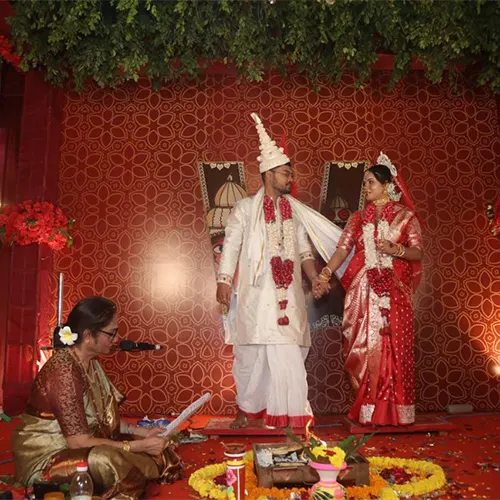
Marriage in the Vedic tradition has always been more than just a social contract. Rooted in the spiritual principles of dharma, karma, and moksha, Vedic Marriage was designed to unite two individuals not just in this life, but across lifetimes. But as society evolves, so must our rituals. At Sumangalam, Kolkata's pioneering collective of women priests, we offer a reimagined Vedic Marriage that stays true to the spirit of the Vedas while embracing the values of equality, mutual respect, and cultural inclusivity.
In this blog, we’ll explore the ancient wisdom behind Vedic Marriage and how Sumangalam’s women priests are reshaping its practice to suit the aspirations of today’s couples.
A Vedic Marriage is a sacred ceremony derived from the ancient Hindu scriptures known as the Vedas. It is not just a union of two bodies, but a joining of two souls committed to supporting each other on the journey toward spiritual realization. The rituals, mantras, and symbols involved are deeply philosophical and represent the ideal of a balanced, dharmic partnership.
Key elements of a traditional Vedic Marriage include:
Vivaha Sankalpa: The declaration of intent by the couple.
Agni Sthapana: Invocation of the sacred fire, the witness to the union.
Saptapadi: Seven steps taken by the couple around the fire, symbolizing vows of partnership.
Mantras and Offerings: Chanting Vedic verses and making offerings to the fire to seal the vows.
These rituals are meant to elevate the marriage beyond mere formality into a spiritual alliance.
While the Vedic framework remains timeless, many practices that evolved around it are rooted in patriarchy. The concept of Kanyadaan, where the bride is 'given away' by her father, reduces her agency and autonomy. The dominance of male priests in conducting ceremonies has also limited the scope of interpretation and adaptation.
Modern couples—especially those who seek equality, consent, and spiritual depth—often find themselves alienated by rigid rituals. This is where Sumangalam steps in.
Sumangalam is a collective of women priests in Kolkata who conduct sacred ceremonies across life stages—weddings, anniversaries, baby naming, housewarmings, and last rites. We uphold the sanctity of Vedic rituals while reshaping them to align with inclusive, progressive values.
No Kanyadaan: We do not perform Kanyadaan. Instead, the couple exchange vows as equals, acknowledging each other's autonomy and commitment.
Women as Priests: Our ceremonies are led by trained women priests who chant Vedic mantras with authenticity and clarity. This alone redefines spiritual leadership and dismantles gender hierarchies.
Multilingual Translations: We ensure that the essence of each mantra is translated and explained in languages the couple and guests understand—Bengali, English, or Hindi.
Inclusion of Rabindrasangeet and Brahmasangeet: Live music and spiritual songs interwoven with Vedic rituals add emotional depth and cultural beauty.
Mutual Vows, Not Ownership: Our ceremonies focus on vows of partnership, friendship, and shared growth rather than ideas of duty or submission.
Every element in a Vedic Marriage has profound spiritual symbolism:
Agni (Fire): Symbolizes purity and divine witness.
Saptapadi (Seven Steps): Represents the foundation of a shared life—from nourishment to strength, prosperity to family, harmony to spiritual growth.
Mangal Sutra and Sindoor: In Sumangalam ceremonies, these are offered as mutual tokens of commitment, not just from groom to bride.
Chanting Mantras: Every mantra is selected not only for tradition but also for meaning, celebrating love, understanding, and union of souls.
Sumangalam has officiated over 300 Vedic Marriages across India, including intercultural, interfaith, and same-gotra unions. Couples often share that they felt truly seen and spiritually uplifted during our ceremonies.
Ananya and Rishi, who married in 2023, shared: “We wanted a wedding that honoured our roots but also reflected who we are. Sumangalam’s women priests made us feel empowered and emotionally connected every step of the way.”
Authentic Vedic rituals without dogma
Emphasis on gender equality and inclusivity
Multilingual ceremonies with contextual explanations
Integration of music, poetry, and storytelling
Emotional and spiritual connection for all present
In a world that is rapidly changing, love deserves a ceremony that reflects both timeless truths and contemporary values. A Vedic Marriage officiated by Sumangalam is more than a ritual—it's a soulful beginning to a lifelong journey.
Vedic philosophy teaches us adaptability, inclusivity, and balance. At Sumangalam, we honour these principles by conducting marriages that feel sacred, sincere, and relevant. A Vedic Marriage is not about replicating the past; it's about renewing it in the light of present-day understanding and compassion.
If you're seeking a marriage that is as meaningful as it is memorable, rooted in ancient wisdom but blooming with modern values, reach out to us.
Q1. Can we have a Vedic Marriage without Kanyadaan?
Absolutely. Sumangalam specializes in ceremonies that honor the spirit of Vedic rituals while discarding outdated practices like Kanyadaan.
Q2. Are women allowed to perform Vedic rituals?
Yes. The Vedas do not prohibit women from chanting or officiating. Our trained women priests conduct ceremonies with full Vedic authority.
Q3. How long does a modern Vedic Marriage ceremony take?
Usually between 1.5 to 2 hours, depending on the rituals chosen by the couple.
Q4. Do you include music and translations in the ceremony?
Yes. Rabindrasangeet, Brahmasangeet, and clear explanations make the ceremony emotionally rich and accessible to all.
Q5. Can you conduct interfaith or same-gotra Vedic marriages?
Yes. We believe love transcends boundaries, and we craft ceremonies that respect your unique story.
Let Your Wedding Be Sacred, Equal, and Beautiful
Choose a Vedic Marriage that celebrates your love with dignity, meaning, and joy. Choose Sumangalam.
© 2025 Sumangalam . All Rights Reserved | Design & Developed by DITS